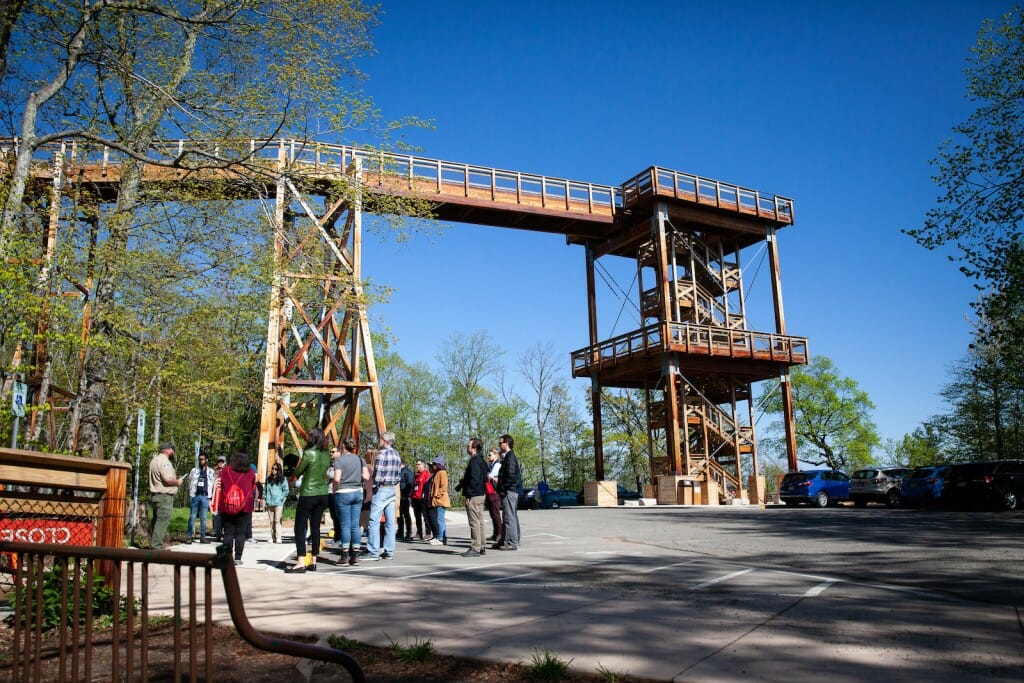
Wisconsin Idea Seminar participants gather at the foot of the ADA-accessible Eagle Tower to meet Eric Hyde, the superintendent of Peninsula State Park, to learn about some initiatives that enhance accessibility at state parks. Eagle Tower, which offers spectacular views of Lake Michigan, was inaugurated in 2021, and was made possible through partnerships with local state legislators, the DNR and the Friends of Peninsula State Park. Photo by Catherine Reiland/UW-Madison
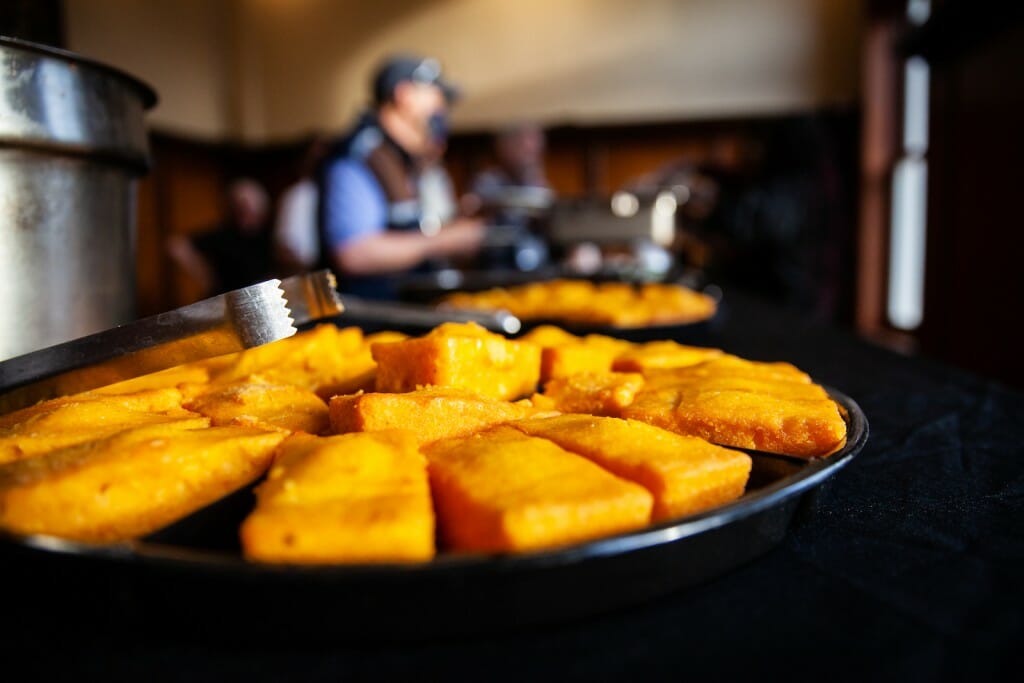
Fresh corn bread glows in the late afternoon sunlight at Milwaukee’s Turner Hall where Jervel Williams, owner of Mister Bar-B-Que, served up smoked BBQ ribs, beef brisket and a variety of sides. Photo by Catherine Reiland/UW-Madison
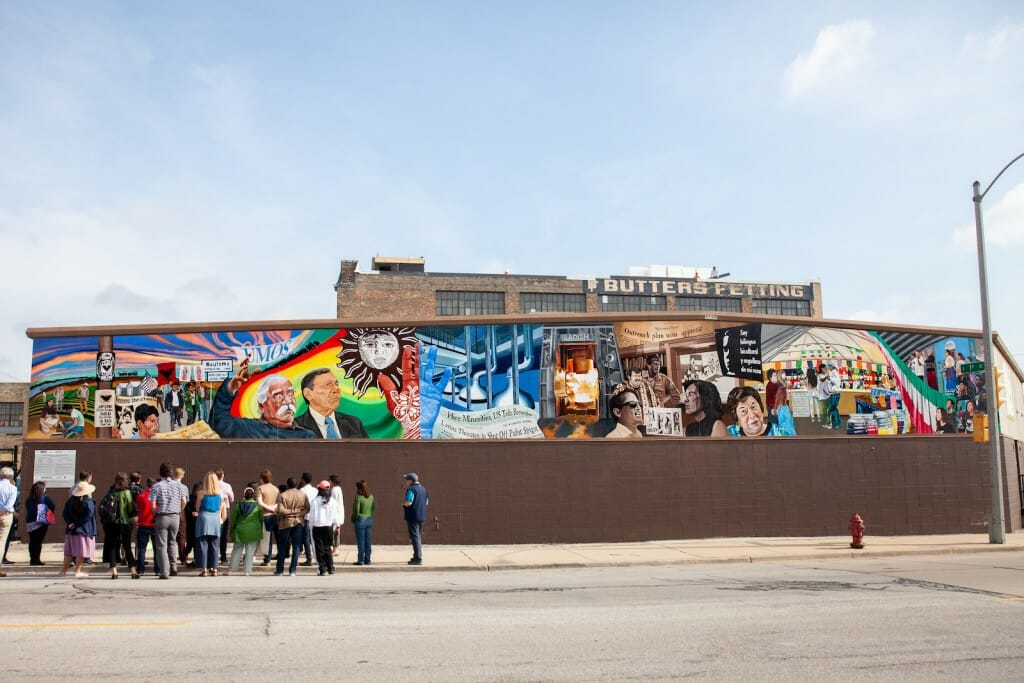
On the fifth anniversary of its dedication, the Wisconsin Idea Seminar visits “Culture Work,” a 90-foot mural that extends the length of the Butters-Fetting Company building on Milwaukee’s south side. The mural, painted by Raoul Deal and art students from University of Wisconsin-Milwaukee and high school interns, honors the 50-year history of the United Migrant Opportunity Services (UMOS) and struggles mobilized by hope. Photo by Catherine Reiland/UW-Madison
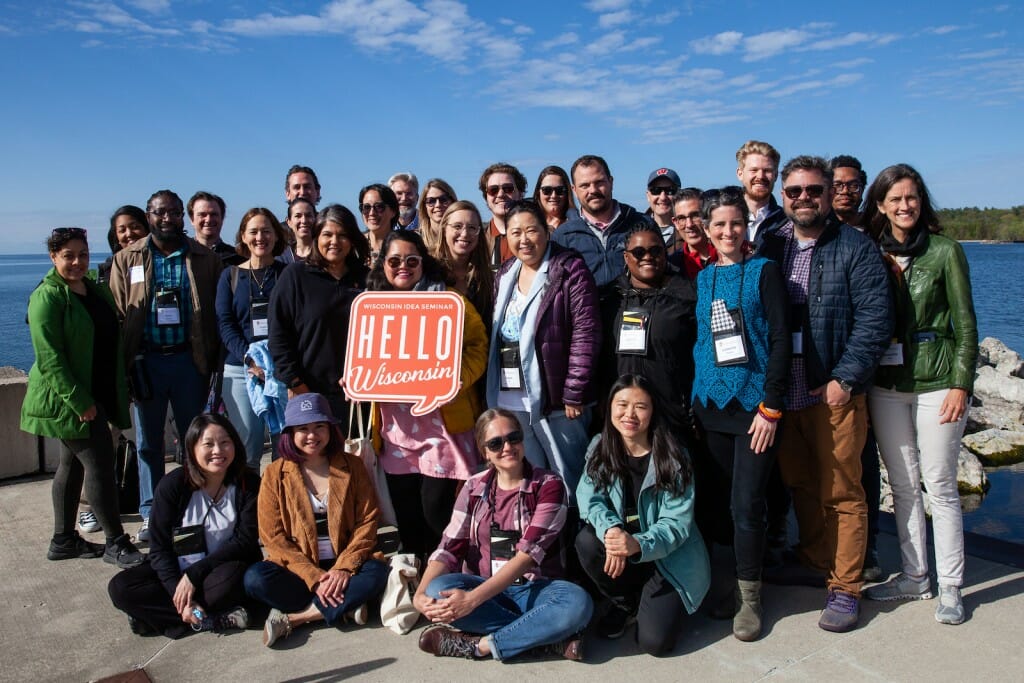
Participants of the Wisconsin Idea Seminar “Bay Tour” stand at Lake Michigan on the western side of Door County in Fish Creek. Photo by Catherine Reiland/UW-Madison
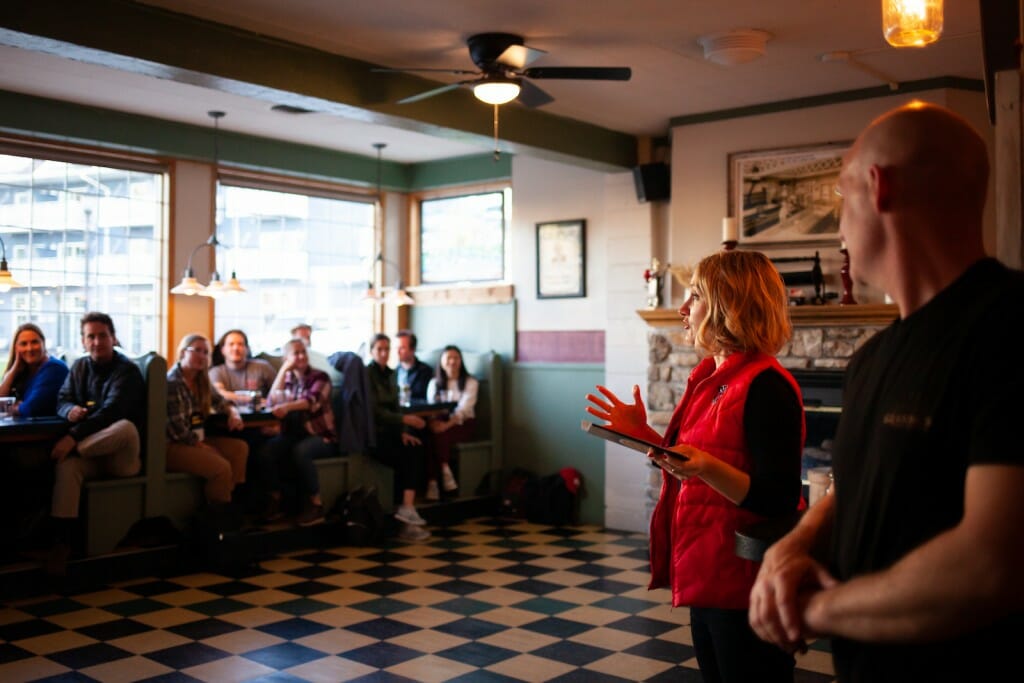
Jess Grasse, an alumna of the UW–Madison’s School of Nursing, is the co-owner of Grasse’s, a restaurant she founded with her husband and chef, Jimmy Grasse. The family-run restaurant is housed in the former Kramer-Grasse Dairy in Sister Bay where Jimmy grew up. Jess tells the Wisconsin Idea Seminar participants the motivations behind opening the restaurant, how they leveraged creativity to respond to the pressures of the pandemic, and how she and her husband cultivate community relationships to bring Door County products to the table. Photo by Catherine Reiland/UW-Madison
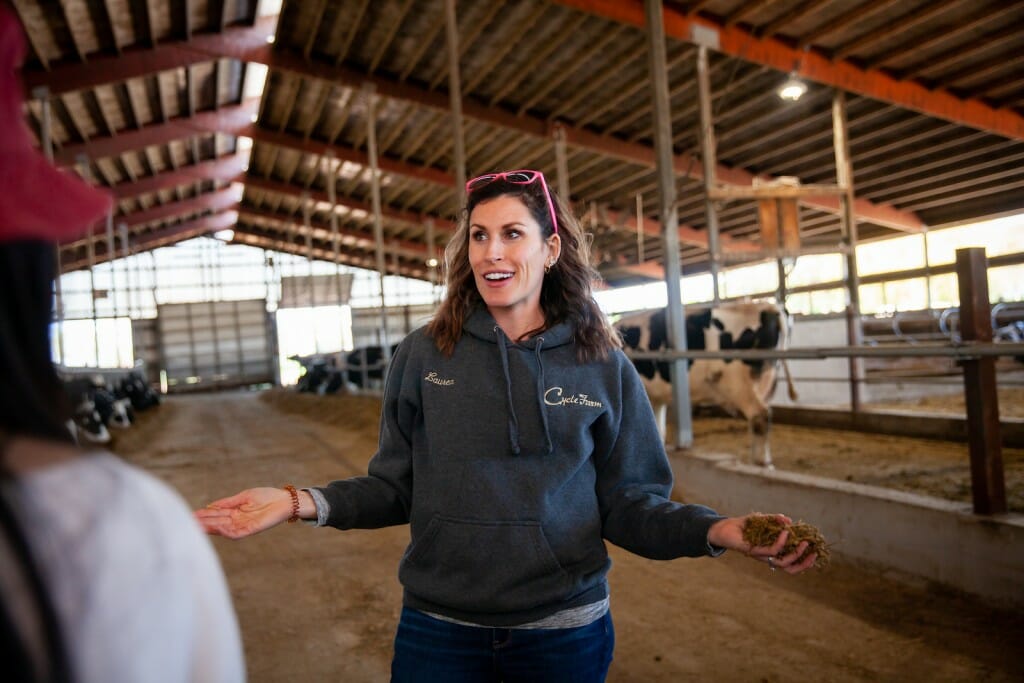
Lauren Brey, a UW–Madison alumna and co-owner of Brey Cycle Farm, outside of Sturgeon Bay, holds a handful of feed as she explains the mix of ingredients that optimize the health and well being of their dairy herd. Photo by Catherine Reiland/UW-Madison
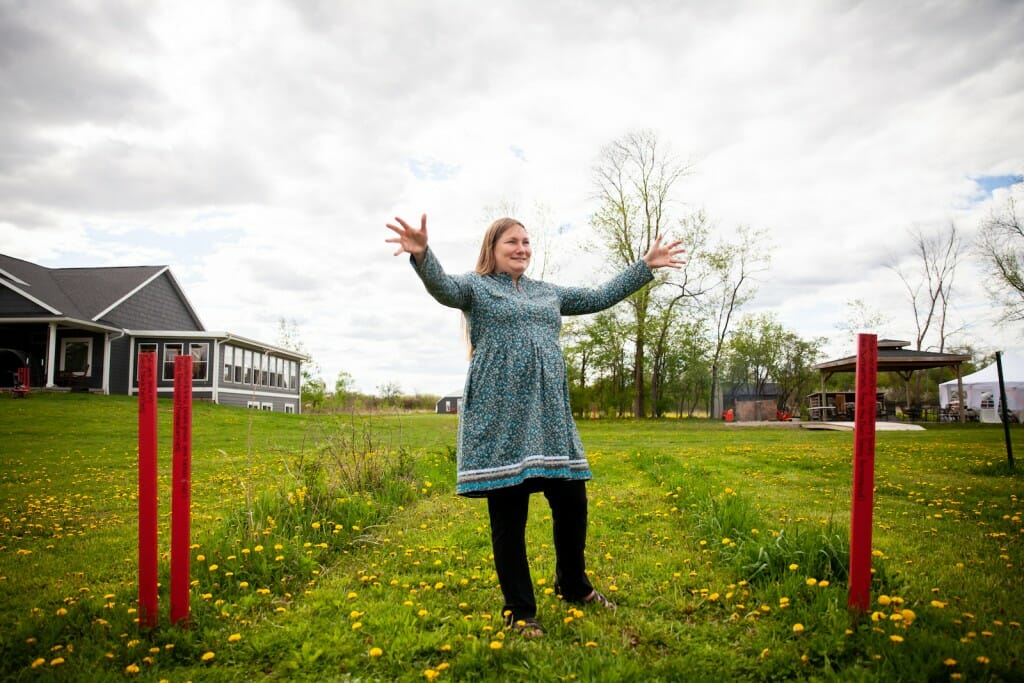
Becky Webster, an assistant professor at the University of Minnesota Duluth, and UW–Madison alumna, explains how her family is transforming ten acres of once-dormant agricultural land into a vibrant place called Ukwakhwa: Tsinu Niyukwayayʌthoslu, where they cultivate traditional, heirloom foods and teach harvesting, seed-keeping and the preparation of Oneida foods. Photo by Catherine Reiland/UW-Madison
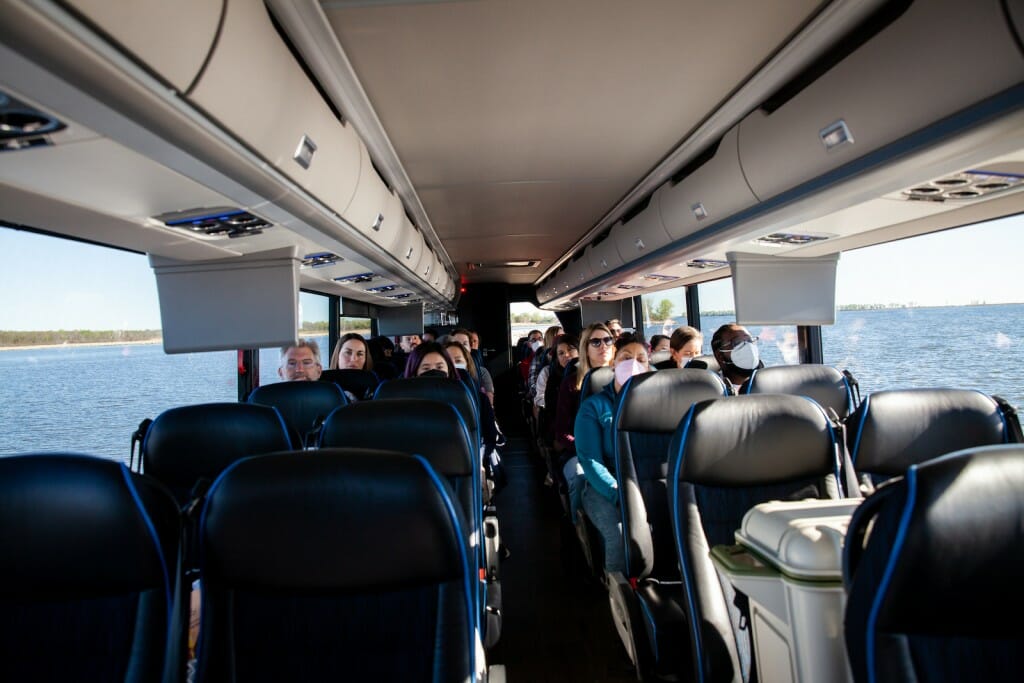
Rolling along a narrow ribbon of road on the Cat Island Restoration Project, the bus is surrounded by the choppy waters of the Green Bay. Photo by Catherine Reiland/UW-Madison
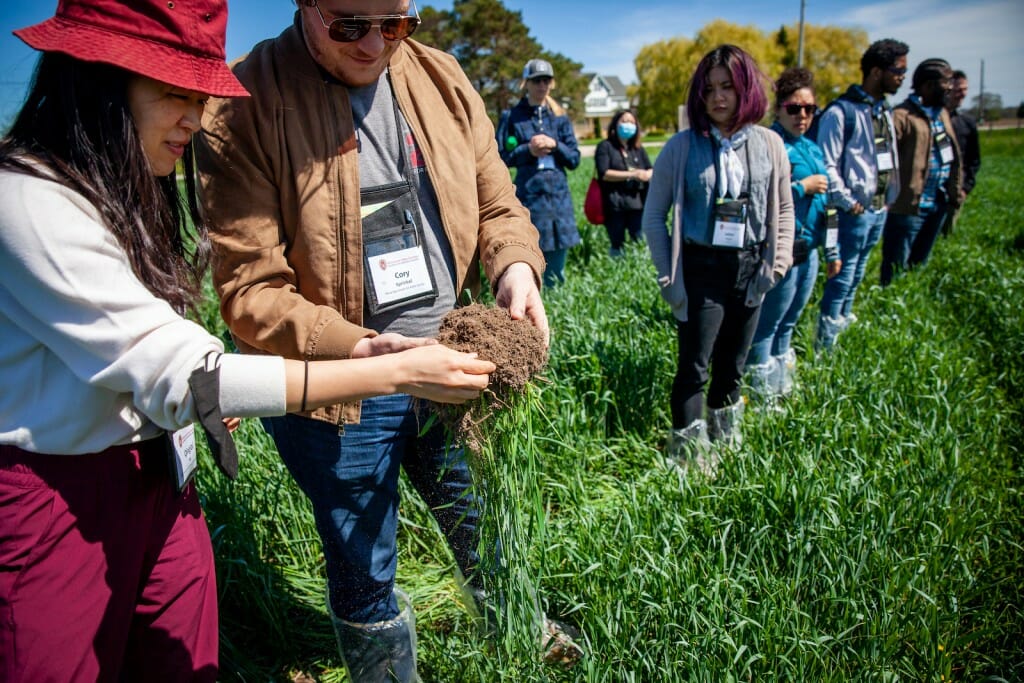
At Brey Cycle Farm, outside of Sturgeon Bay, Qinglai He, an assistant professor of Operations and Information Management, stands alongside Cory Sprinkel, a community engaged scholarship specialist from the Morgridge Center for Public Service, to examine the roots of a cover crop called triticale. Brey Cycle Farm partners with UW Extension and others to advance and adopt conservation practices, like cover crop rotation and low-disturbance manure application. Photo by Catherine Reiland/UW-Madison
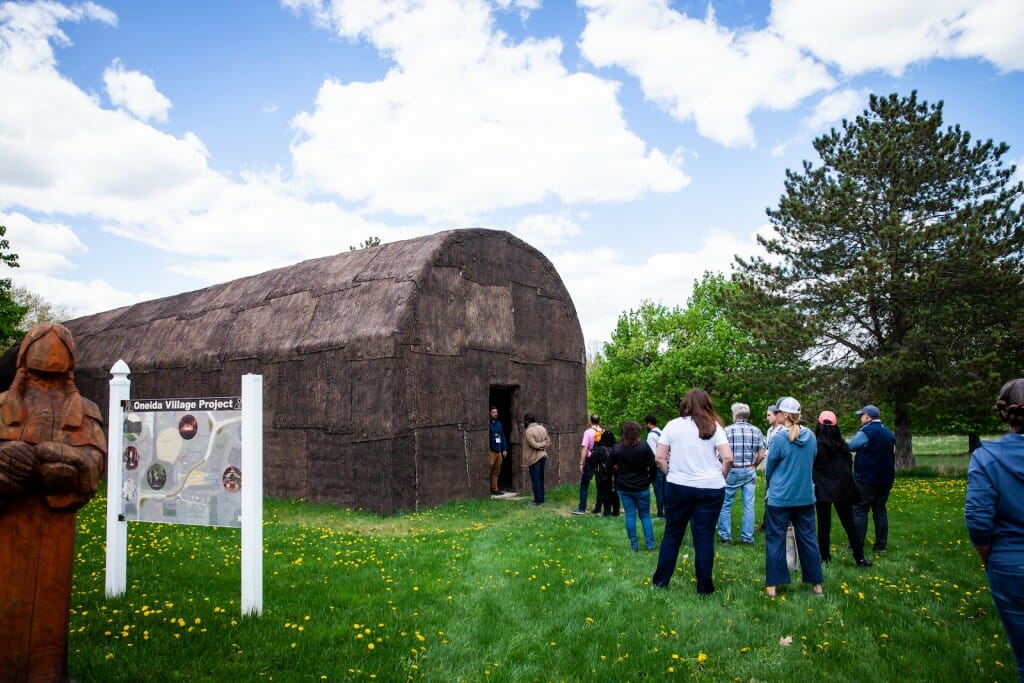
Wisconsin Idea Seminar participants form a line outside of the longhouse at Salt Pork Avenue, a cultural heritage site on the Oneida Reservation, where visitors can learn about Oneida history. Michelle Danforth, director of Oneida Tourism, smudged the participants, wafting aromatic smoke around them as they crossed the threshold. Photo by Catherine Reiland/UW-Madison
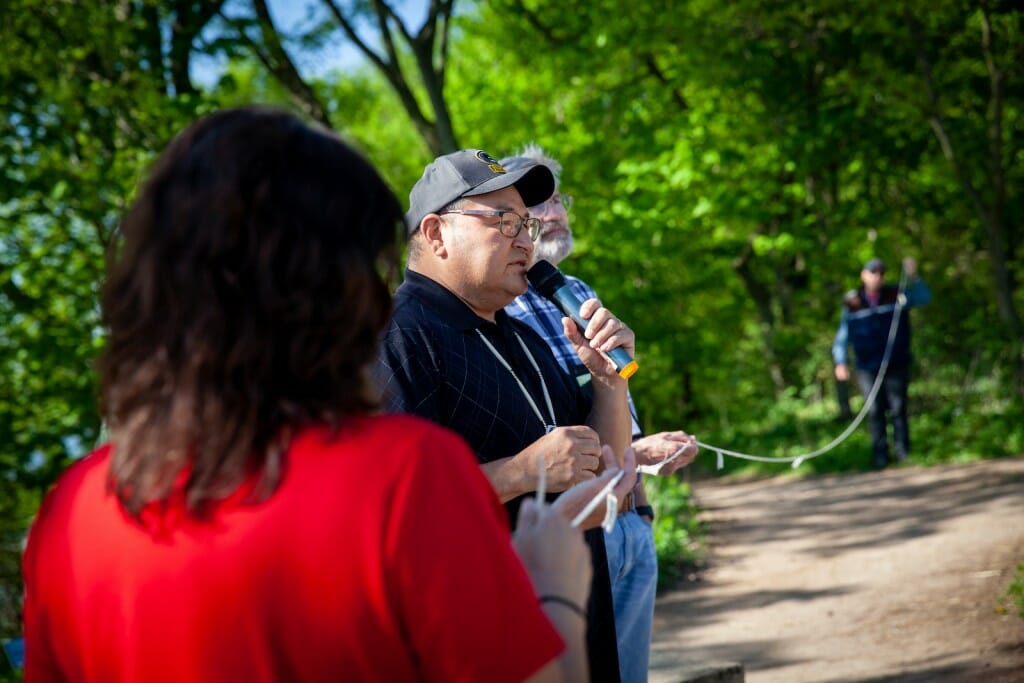
At a fire circle in the Lakeshore Nature Preserve, Bill Quackenbush, the Ho-Chunk Nation’s Tribal Historic Preservation Officer, illustrates with a length of string the longitude of human activity at Teejop. The recent two thousand years are held near Quackenbush (center) and the 12,000-year mark is anchored in the distance by Todd Shechter, Chief Technology Officer, Division of Information Technology. The Lakeshore Nature Preserve was the first stop of the 2022 Wisconsin Idea Seminar’s “Bay Tour.” Photo by Catherine Reiland/UW-Madison
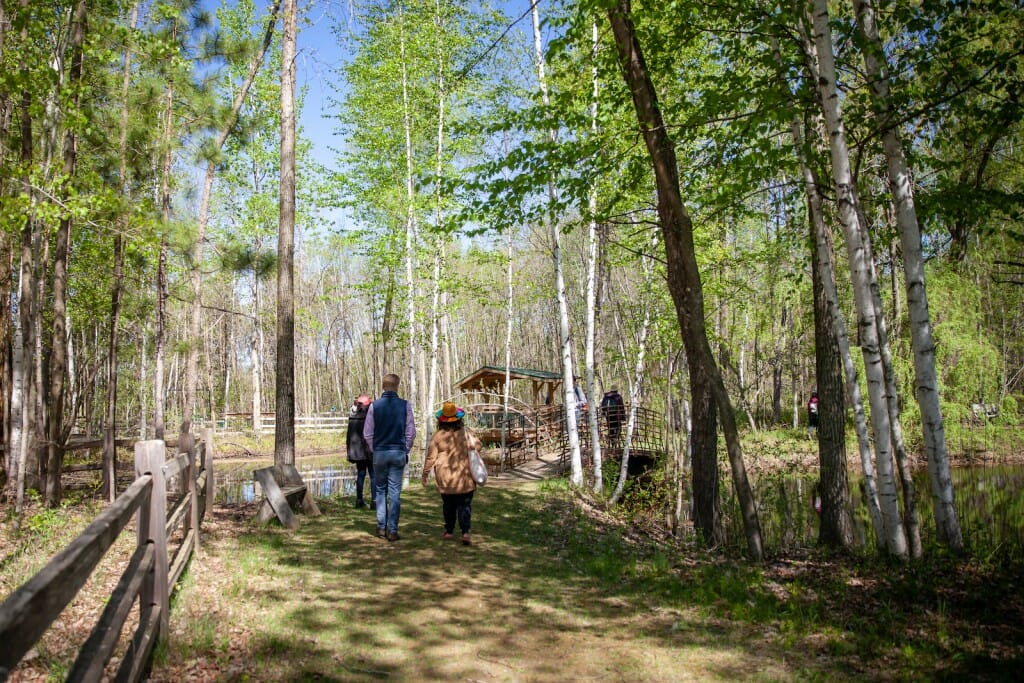
At the Barkhausen Waterfowl Preserve, outside of Suamico, Wisconsin Idea Seminar participants stroll through the Sensory Woods, a trail that debuted in 2018. It was designed for people living with dementia and their caregivers. With a railed boardwalk, flat terrain, and interactive stations, not only does it serve the dementia community, it also enhances the accessibility and inclusivity for a wide range of audiences to explore nature. Photo by Catherine Reiland/UW-Madison
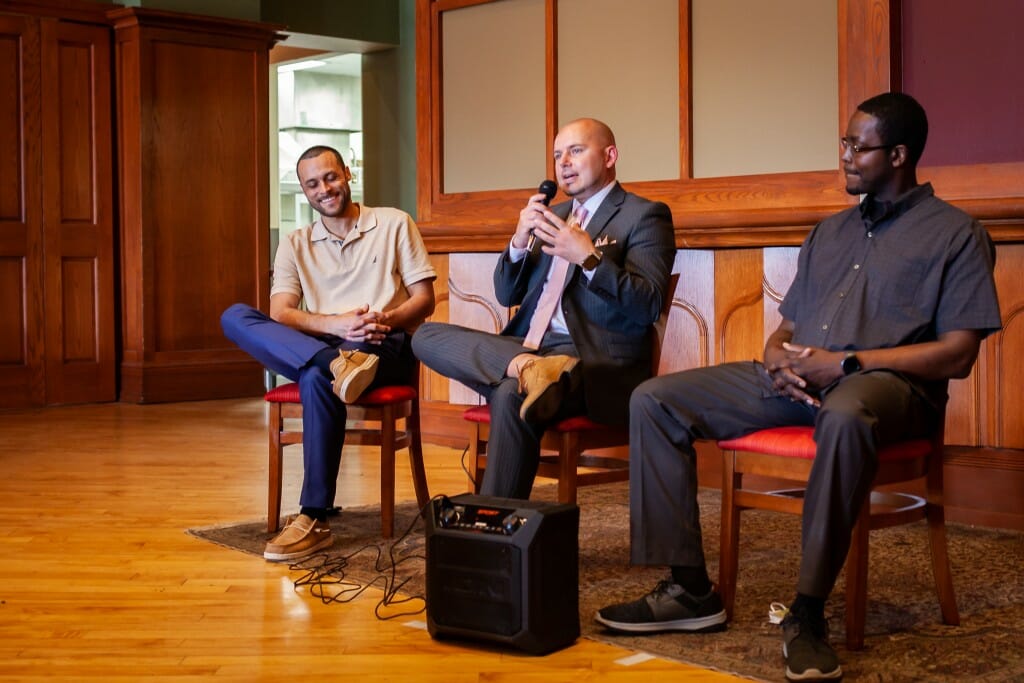
At Milwaukee’s Turner Hall, Adam Procell, co-founder of Paradigm Shyft, a strategic reentry consulting firm, explains the valuable contributions that system-impacted people can make to strengthen communities. Procell is joined by Shannon Ross (left), the founding executive director of the nonprofit The Community, and Roy Rogers (right), a pre-entry liaison for that organization. The roundtable was moderated by Cecelia Klingele, associate professor from the UW Law School. Photo by Catherine Reiland/UW-Madison
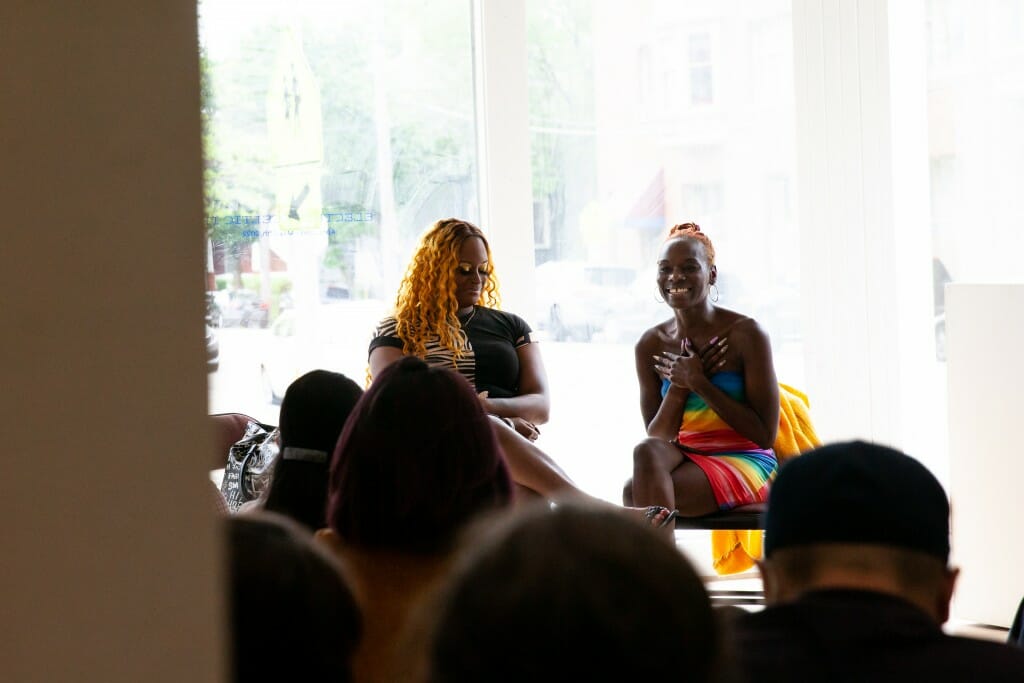
In a conversation about Queer youth activism, Elle Halo, an inclusion health program specialist, and Annia Leonard, a community coordinator for the MKE Good Food Bus, reflect on the leadership roles of Queer people within the Black Lives Matter movement. Photo by Catherine Reiland/UW-Madison
Lake Michigan and the people who live along its shores shaped the contours of our learning during the 2022 Wisconsin Idea Seminar’s “Bay Tour.”
For five days along 600 miles, our cohort of 29 faculty and academic staff became students of Wisconsin life and together contemplated how our work at the university can be animated by respect, reciprocity and responsibility to people, land, and water.
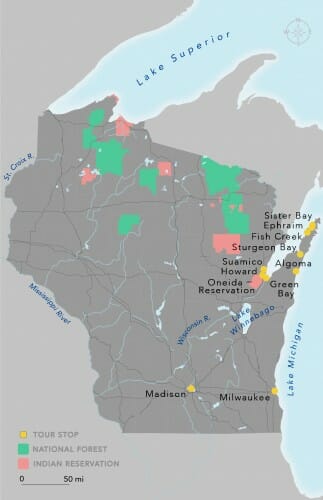
The 2022 Wisconsin Idea Seminar route covered over 600 miles with twenty stops where participants met with environmental stewards, Indigenous farmers, growers, community storytellers, entrepreneurs, artists, high school students, and many others. Map by Katherine Koehler, Cartography Library, UW–Madison
The Wisconsin Idea Seminar is a five-day study tour of Wisconsin that offers faculty and staff the opportunity to learn firsthand about the social and cultural contexts that shape the lives of many of our Wisconsin students, and to see what the Wisconsin Idea looks like in practice. Of particular interest are partnerships that are rooted in local communities and shaped by local priorities.
Throughout our journey we heard directly from Wisconsinites who fundamentally understand that communities thrive when people come together with respect, creativity, and a desire to work for the collective good.
We began our journey at Lake Mendota where Bill Quackenbush, the Ho-Chunk Nation Tribal Historic Preservation Officer, reminded us of the longitude of human activity along the lake’s shores. We met Becky Webster, an enrolled citizen of the Oneida Nation in Wisconsin, and UW–Madison alumna, who recently founded a farmstead on the Oneida Reservation where she and many others are asserting their sovereignty through the cultivation of heirloom seeds and Indigenous agricultural practices. We met with educators and students at Algoma School District to learn how they flex civic muscle through intentional intergenerational collaborations. Later in the week we visited Milwaukee’s 19th century Turner Hall for a roundtable with formerly incarcerated people who work to uplift the stories and correct the narrative of system-impacted people who are contributing to stronger communities. Our last stop was at Walker’s Point Center for the Arts on Milwaukee’s south side where we participated in collective art-making to deepen our understanding of the power of art to unify and empower communities.
We are so grateful to the tireless and generous collaborators across the state who spent months planning, consulting, and offering expert guidance and ideas that strengthened and enriched our collective learning.
And at nearly every stop, we met with UW–Madison alumni — dairy farmers, an ornithologist, a restaurant owner, a development manager, a school superintendent, an artist, just to name a few – who are proud of their alma mater and who bring a Badger spirit to the work they do in their home communities.
The Wisconsin Idea Seminar is a program of the Provost’s Office and is made possible with the support of many UW–Madison schools and colleges and the Evjue Foundation, the charitable arm of the Capital Times and long-time underwriter of the seminar since 1985.
A special thanks to Phoua Holt, executive assistant in the Office of the Provost, whose assistance contributed to the success of the 2022 Wisconsin Idea Seminar.
Subscribe to Wisconsin Ideas
Want more stories of the Wisconsin Idea in action? Sign-up for our monthly e-newsletter highlighting how Badgers are taking their education and research beyond the boundaries of the classroom to improve lives.



















